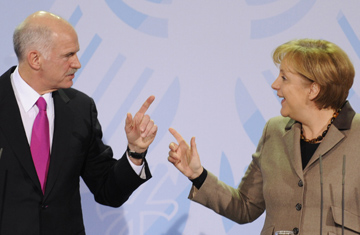
Greek Prime Minister George Papandreou and German Chancellor Angela Merkel at a press conference in Berlin
Politicians, like poker players, know the importance of keeping a straight face. Even when they're holding the feeblest of hands, they have to ensure that their opponents never know how close they are to folding. But in the epic poker match between German Chancellor Angela Merkel and Greek Prime Minister George Papandreou over a potential European Union bailout of debt-ridden Greece, who is the real deal and who is bluffing?
Papandreou is certainly raising the stakes. Greece's public finances are in a parlous state, and Papandreou says the government must refinance a large chunk of its fast-growing debt — conservatively estimated at 125% of GDP — or risk defaulting on its loans. He wants E.U. leaders to agree once and for all on a financial safety net for his country when they meet for a summit in Brussels on Thursday and Friday. If the E.U. can't come to terms on a rescue plan, he says, Greece will be forced to turn to the International Monetary Fund (IMF) — a move that could undermine the credibility of the euro.
Merkel has so far been unmoved. She says that Greece, which has enacted stiff austerity measures to slash its budget deficit, does not need an influx of outside money yet. She is backed by the German public, which is reluctant to spend its hard-earned cash bailing out a country it sees as reckless, feckless and even corrupt.
Like a true card shark, Merkel seems prepared to call Papandreou's bluff. The Greek leader had counted on the E.U. to collectively recoil in horror at the idea of his country's going to the IMF, but Merkel is effectively daring him to do it. Speaking to the German Parliament in Berlin last week, Merkel said that calling in the IMF "would probably have to be the way out right now if action were to be taken." She went on to say that the euro-zone countries should be able to kick out one of their own to avert a crisis in the future — a statement deliberately aimed at Greece.
The effect of this spat has been to push the euro to a four-week low against the dollar as investors fret over the uncertain prospect of support for Greece. The euro closed on Tuesday at $1.35, down from a high of $1.51 in November. "The leaders are hardening positions but not for a clearly thought-out purpose," says Fredrik Erixon, director of the Brussels-based European Centre for International Political Economy. "It looks more like a chicken farm than anything else."
The two leaders' respective supporters have upped the ante in the showdown this week. Bundesbank board member Thilo Sarrazin warned that if Greece cannot pay its bills, "it should do what every debtor has to do and file for insolvency." And the fiery Greek Deputy Prime Minister, Theodoros Pangalos, accused Germany of betting on rising Greek bond yields. "In allowing monetary and credit institutions to take part in this miserable game, people in Germany are making money," Pangalos said.
Other players have waded into the fray too. José Manuel Barroso, the European Commission president, has urged Merkel to agree on a package of "coordinated bilateral loans" for Greece — or risk harming the euro. European Central Bank President Jean-Claude Trichet and French President Nicolas Sarkozy have also dismissed the IMF option, saying it would make the E.U. look incapable of resolving its own crises. (Sarkozy has his own reasons for keeping the IMF at bay: its managing director, Dominique Strauss-Kahn, is a potential rival in France's 2012 presidential election.) Others, like French Finance Minister Christine Lagarde, have criticized Germany for making impossible demands on Athens by saying that E.U. support is only conceivable if Greece accepts draconian austerity measures that will shrink its economy further and make it more difficult to pay off its debts.
Yet for many Germans, Merkel is right not to put their country's money on the table too soon, as it could lift the pressure for reform in Greece. "That would risk setting a precedent of profligate countries taking advantages of the others," says Silvio Peruzzo, a London-based analyst at the Royal Bank of Scotland. "If you set up a bad incentive, then you undermine the credibility of the euro zone. In that sense, the Germans are much more forward-looking."
But even if Merkel says Greece is in no immediate danger, there are doubts about whether it can survive for much longer without outside financial help. Simon Tilford, chief economist at the London-based Center for European Reform think tank, says Merkel's brinkmanship is understandable given the political risks of Germany's conceding too soon but that she cannot hold out indefinitely. "It is implausible that Greece could get through the rest of this year unaided," he says. "Ultimately, the Germans will put something on the table. They will always defend the stability of the euro."
If Merkel blinks and that happens, Papandreou's audacious gamble will pay off. But it could be a long and nervous wait until she finally shows her cards.
